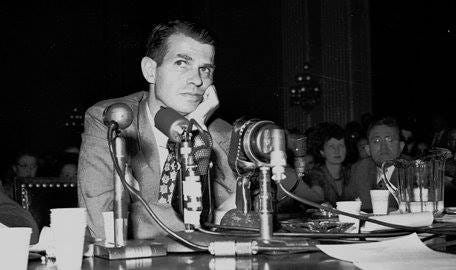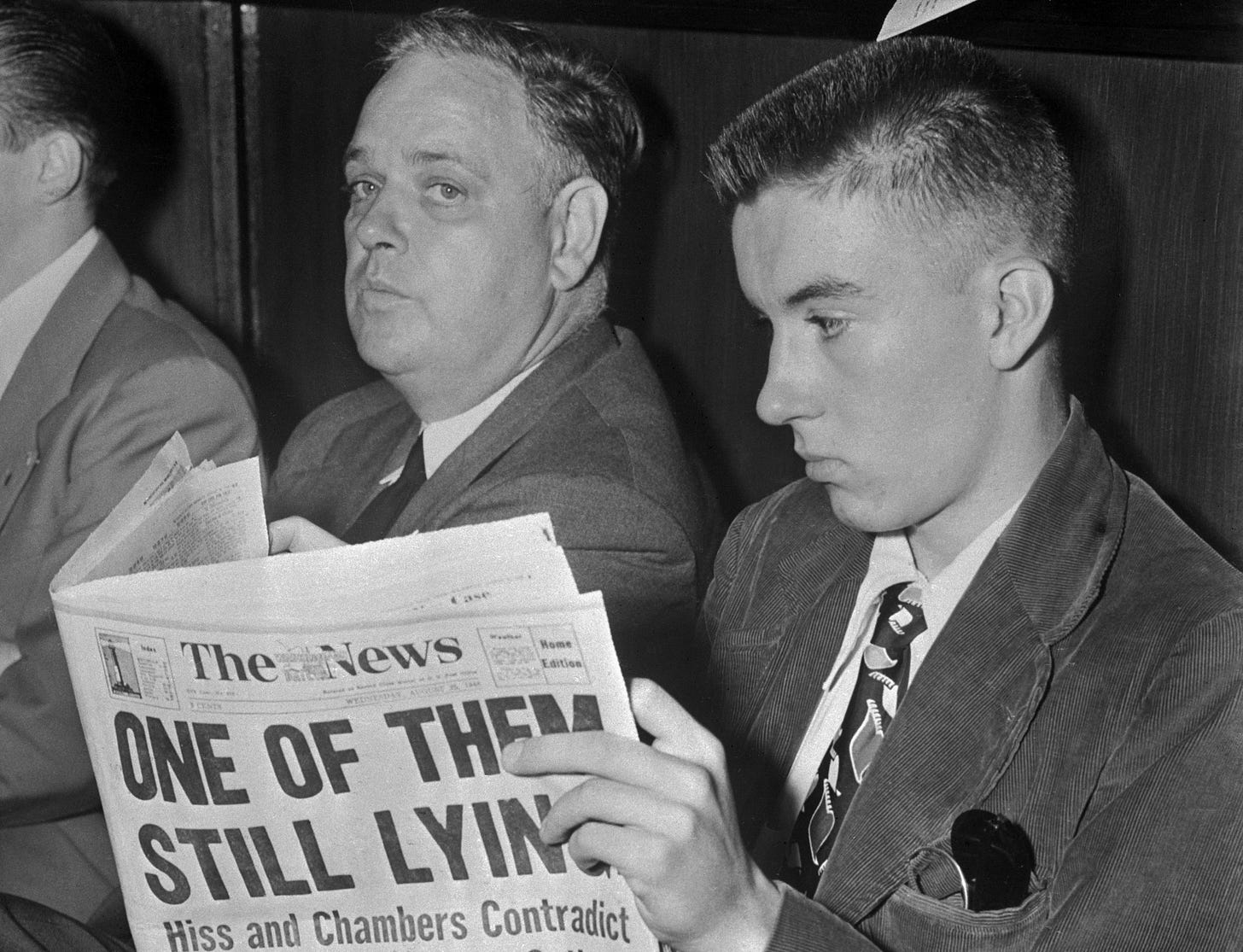The UN and Alger Hiss: Why it has always been anti-American
The history of how the UN started and why, is going to shock you.
Did you know the man who had the UN placed in our country was a KGB spy? The place is a hotbed for spies so I don't really care if they laugh or not. Alger Hiss pushed for the UN to be set up in the United States. Stalin felt having the UN here would mean the U.S. could be attacked verbally on its own soil. Hiss not only fought to have the UN here, he hand picked 250 people that would end up working there representing us! This was a terrible blow to the Pond (our secret spy agency), who looking over the names saw name after name of spies they had turned in years earlier! All ignored by FDR!
They don’t teach this in America! Hiss at the Yalta talks.
This was however, only one of the things that Hiss accomplished that would hurt this country for decades to come. Believe it or not, after being exposed as a spy years earlier, FDR put Hiss in charge of security at the Yalta Talks, the talks to determine the future of the world after World War 2. Fearing a 3 to 1 front against Stalin at the talks he and his spies argued against France being at the talks represented by Charles Degalle. That exclusion outraged the French and continues to create friction to this day between France and the U.S., those talks would also turn over millions of people over to Stalin. People that had been promised free elections and democracy, found themselves under a new tyrant. The Yalta Talks were riddled with wiretaps and film cameras. Even the bathrooms were wiretapped. There was nowhere FDR and Churchill could go without being listened to.
January 21, 2007, is the 57th anniversary of George Orwell's death and I want to take this opportunity to point out a coincidence I noticed a couple of years ago. It turns out that Alger Hiss -- one of USA President Roosevelt's closest advisors and the first Secretary General of the United Nations -- was found guilty of being a Communist spy and thrown into prison on the same day Orwell died - January 21, 1950. Symbolically, this is also the day in 1924 that Vladimir Lenin, leader of the Communist overthrow of Russia in 1917.
Orwell, one of Communism's greatest enemies, would have been pleased about Hiss being jailed. His book - "Animal Farm", was an analogy, in large part, of life under Lenin and Stalin.
In 1947 Alger Hiss was an ascending star. The Harvard graduate was a well-educated and talented lawyer and negotiator who had been closely identified with Franklin Roosevelt's "New Deal" in the 1930s. Experience in international diplomacy had brought him the honour of temporary secretary-generalship of the United Nations, and he had just become president of the Carnegie Endowment for International Peace.
Suddenly it was claimed that this talented and respected man was a spy, sending the Russians sensitive information from the hightest levels of American politics. The allegations came from the mouth of Whittaker Chambers, a senior editor of Time magazine, and a tortured ex-communist eager to expose those with whom he had plotted in his past. Chambers was testifying before The House Un-American Activities (HUAC).
Whittaker Chambers center.
Chamber's version of events was that Hiss and several other named people were members of a communist group during the 1930s. This was a particularly damaging allegation to someone in Hiss's position, and the lawyer sued the journalist for libel.
Chambers now expanded his claims by saying that Hiss had acted as a spy for the Russians. According to him, Hiss had brought State Department documents home, had them re-typed by his wife, and passed these copies to Chambers while the originals were returned. Chambers had photographed the papers and sent them to a Russian agent....
Further evidence was produced by Chambers after a visit to his Maryland farm, when he returned to HUAC with 35mm film stored, he claimed, in a hollowed-out-pumpkin. On the film were various State Department documents. Both men were now called before a grand jury investigating these claims of espionage. (My note: It is important to remember that the fact we could read the KGB messages had to be hidden or Russians would just change their code. I doubt there was really a pumpkin, but I don’t doubt we intercepted the message).
If Hiss was a spy, the repercussions were endless. He had attended the post-war Yalta Conference in 1945, rubbing shoulders with Roosevelt, Stalin and Churchill. The same year he was made director of the office of special political affairs, responsible for forumlating plans for the United Nations and other aspects of the peace settlement. The Russians would have benefited enormously from tip-offs about American thinking at this time, and from the other inside information that passed across Hiss's desk. Now the Cold War had set in and America feared none more than the communists, and here was an Ivy League man who had helped the enemy. If this was true, it was a major scandal.
A key piece of evidence was the typewriter on which Mrs Hiss was said to have typed the documents. The prosecution produced forensic evidence showing it was the machine on which the copies produced by Chambers were typed....
The jury at the first trial failed to reach a verdict, but a second trial found Hiss guilty on 21 January 1950. He received a five-year sentence. Alger Hiss was released on 27 November 1954, and has protested his innocence ever since.
If he was guilty, he paid a very low price for someone who had given state secrets to a foreign power. There are those...who believe Hiss was guilty, and that Chambers was an American hero. Indeed, in 1984 President Reagan posthumously awarded Whittaker Chambers with the Medal of Freedom, saying the ex-communist "personified the mystery of human redemption in the face of evil and suffering".
Most historians now accept that Alger Hiss fed secrets to Soviet agents...Hiss was the elegant diplomat who sat behind President Franklin Roosevelt at his Yalta meeting with Stalin and managed the conferences that created the United Nations.
In 1948 his once warm friend Whittaker Chambers called him a Communist before the House Committee on Un-American Activities. The accused, Hiss, was a suave, handsome and highly credentialed government official; Whittaker, the accuser, was a fat, rumpled ex-Communist with bad teeth and a gnarled personality. Hiss haughtily dared Chambers to repeat his charge in a legally unprotected setting, never suspecting that Chambers possessed proof of their sying. But Chambers promptly complied and Hiss was compelled to sue for libel, forcing the accuser to present evidence. Chambers confessed to previously being a spy and produced copies of documents that he had stashed away 10 years earlier to protect himself against retribution by Stalin's agents. The documents had provably crossed Hiss's desk at the State Department and been copied on Hiss's typewriter, by his wife, Priscilla. The evidence prevailed at a second trial.
"If Hiss had disappeared after 44 months in prison", says author Edward White, "he would have been just one other undercover agent who had lied, betrayed his country and gotten caught". But steered by Hiss, his loyal son, Tony, and ardent supporters, undeterred even by damning discoveries in Soviet communications, Hiss sold himself to gullible college audiences. He acquired credibility as his pursuers, including Joseph McCarthy, lost theirs. By the time of his death in 1996, Hiss had regained much of his footing, including his government pension and even his license to practice law in Massachusetts.
Behind the paywall: Sword & Shield - The History of the KGB
Russia – the largest country on Earth. Misunderstood by many and feared by even more. For the past century, Russian history has been intertwined with the history of its security services, which were used by the Soviet state to crush dissent. Millions suffered at the hands of the most extraordinary and dangerous security network the world has ever known – mass executions, clandestine wars, coups d’état, spies who were capable of stealing the atomic bomb from America, and hacking and poisoning scandals. While many things have changed in modern Russia, the security network is arguably as strong as ever. The reason behind this is the rise of a lowly lieutenant colonel to President of this vast country, Vladimir Putin.
Keep reading with a 7-day free trial
Subscribe to Hidden Cold War History to keep reading this post and get 7 days of free access to the full post archives.






